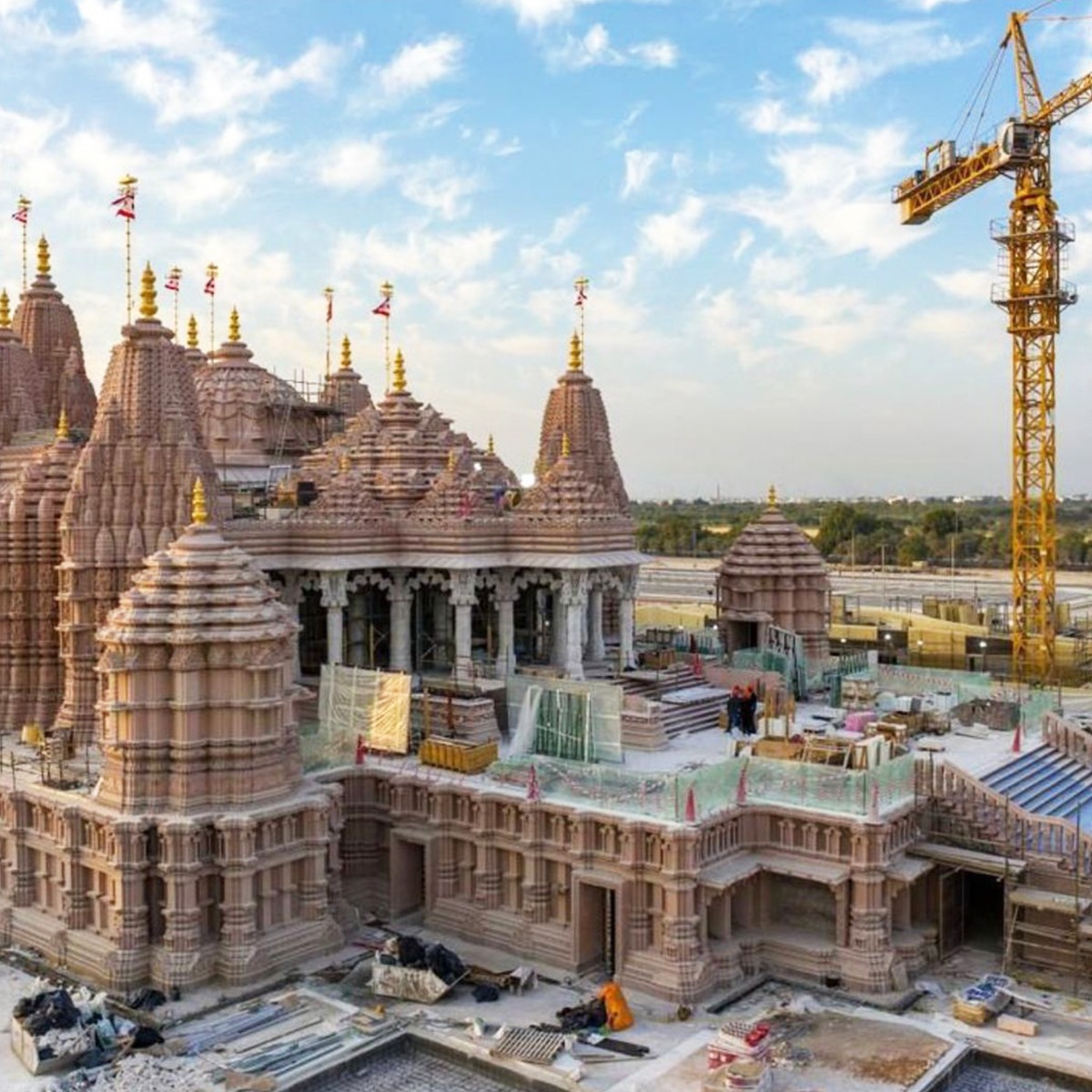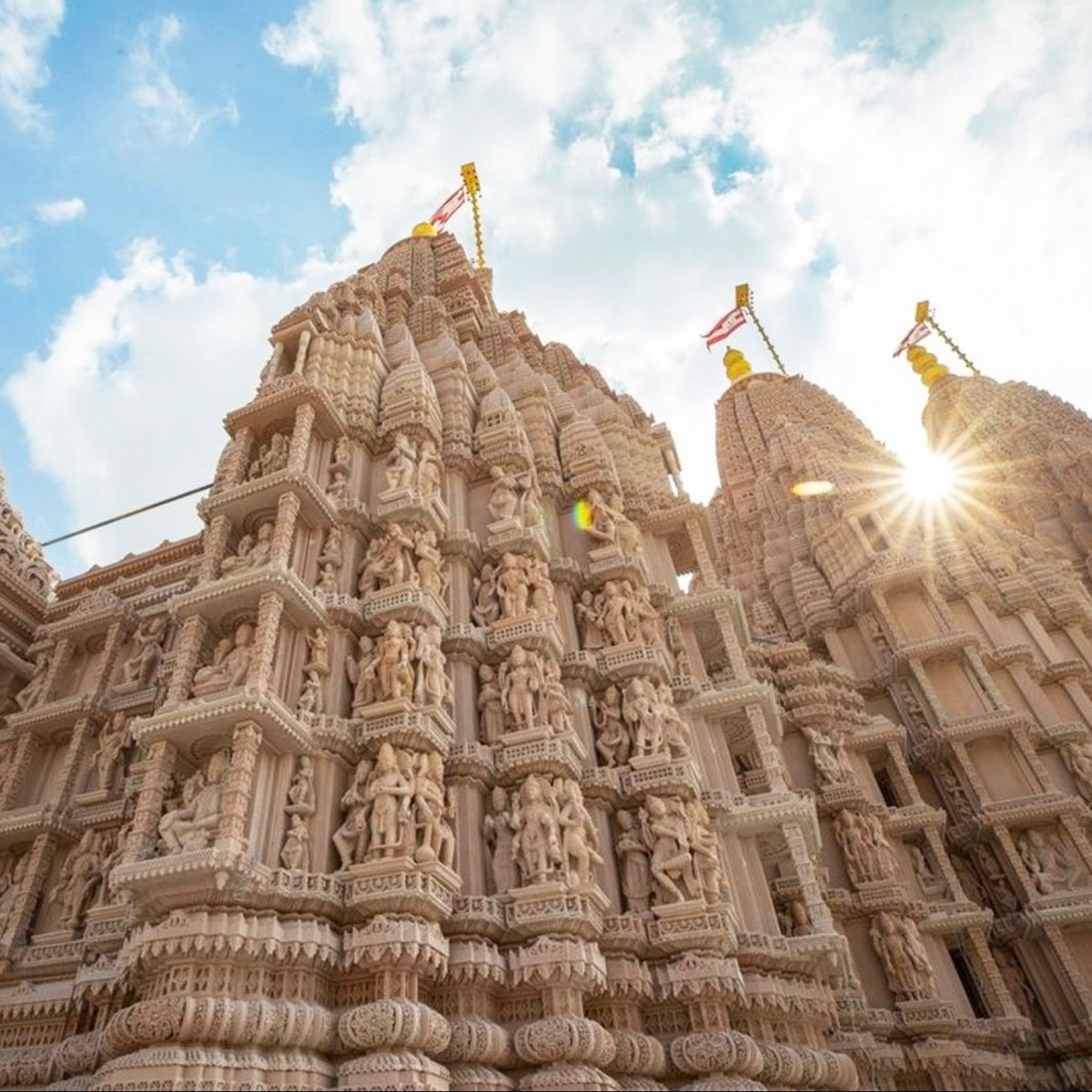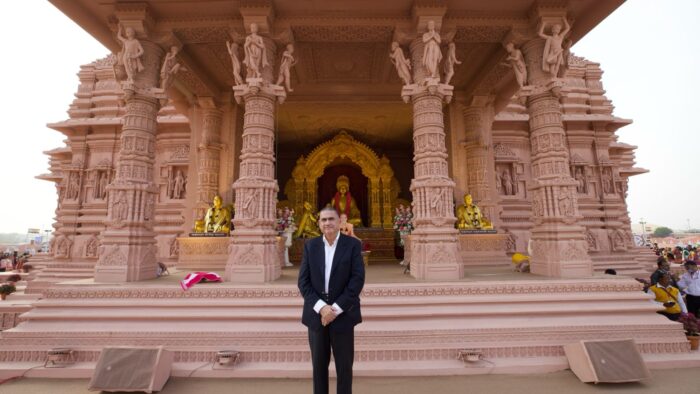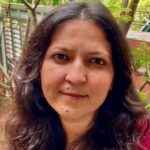Veda Studies’s Sophie French talks to Mr Nazem Al Kudsi about the first major temple to be inaugurated in the Middle East and how reciting Veda keeps his overactive mind focused.
My parents had an interfaith marriage and they fought the world for it. Growing up between India and the Middle East, I was bullied in both countries (by family in India and by friends in Dubai) for my mixed roots. So when my Veda teacher, Shantala Sriramaiahji, asked me to interview Abu Dhabi-based Mr Nazem Al Kudsi about his involvement with the Middle East’s first major Hindu temple, I was intrigued, curious and a little weary given my history with the region, but within five minutes of talking to Mr Al Kudsi, I was feeling elated, hopeful and thrilled to learn how much had changed in the UAE since I grew up there. I wanted to know everything about this Arab Muslim who recites Veda, has studied Mahayana Buddhism and is well-versed with the Purāṇas and the Gītā.
I asked him to start at the start, “I was born in Aleppo, Syria, and my parents migrated to the UAE when I was four. My dad got a job with the Government, and I grew up in the UAE. I attended high school in Southern California, and after that I went to Washington DC., for my undergraduate degree and then came back to the UAE. I was recruited to the Sovereign Wealth Fund for Gulf countries or the oil-producing countries to invest their excess cash flow. Given the smaller size of their populations relative to the resources, they invest quite a bit in all asset classes across the globe. Fast forward to a few years later and I went back to the States to do my MBA. I then worked for some time in Silicon Valley, I worked in Tokyo, and then eventually found my way back to the UAE.”

When he told me more about growing up in the UAE and stories about his parents in Syria, it didn’t feel or sound like the Middle East I knew. Mr Al Kudsi’s father’s first crush was a Jewish girl — their neighbour in Syria — and he regaled me with stories about Syria and the surrounding regions. “My father is so proud of that story and so proud of having a crush on that girl (laughs).” Growing up in India, most upper class children are sent to Jesuit and convent schools and life in Syria wasn’t very different either, “I was born in a progressive Arab Muslim family. My parents went to Christian schools because it was the thing to do in Syria. Back then, before the country got closed and became too Socialist, the upper class would send their kids to the top schools, which were Christian schools. So my mom went to a Franciscan Catholic school, and my father went to an American Presbyterian school. This gave them a sense of acceptance and we never followed a one-party policy on religion. I myself ventured all over the place in terms of trying to understand who I am and what religion is, and how one can try and approach trying to realise God, and so on,” recalled Mr Al Kudsi.
His interest in comparative religions inspired him to study Mahāyāna Buddhism for several years as well as Tibetan Buddhism but he couldn’t imbibe the concept of Śūnyatā. “I need Bhagavan in my life. The first class I took with Shantala was the chanting of Yoga Sutras and she said something to the extent of ‘I need a relationship with something bigger than me.’ That really rang a bell with me and what sealed the deal was when she told me, ‘We all have some free will in this life and the best way to use the free will is through the power of prayer.’ That is when I knew I had knocked on the right door and arrived at the right address (laughs). I’ve studied Indic knowledge systems in general, albeit, at a superficial level. And even the study I did of Buddhism, I mean, there are a lot of things in Buddhism that are unique to it but a lot of its philosophy is also from the Vedas and Purāṇas. I am all for the all-encompassing and all-accepting values of Sanātana Dharma. When I see sectarianism in any faith or culture and an ‘us’ vs. ‘them’ attitude, I shy away from such associations. I believe that ultimately, divinity is one, even though it manifests in many ways. We can all choose to take different paths to get close to that truth and nobody should take some kind of high moral ground to define their path as the proper or correct or only path. What works for one person might not work for another.

I have been listening to Dr Robert Svoboda’s lectures and reading his books for over 20 years. In 2020, I was listening to one of his lectures and that is when I heard the words Veda Studies for the first time. So I went online and found it and saw that Shantala was offering Yoga Sutra classes so I signed up for the classes. That is how my journey with Veda Studies began and there are two reasons I continue to study and recite Veda. Firstly, Veda is not sectarian and that is very important for me, and secondly, I look forward to the fact that one can spend a lifetime/s studying the Veda because there are layers and layers to each mantra. It is such profound knowledge and I come from a bhakti background. The topic of God has always been important in my family. Whenever we receive good things or difficulties, the name we call upon is God’s name to acknowledge the good and the challenges. I also love research a lot. I can lock myself for days in a room when I am studying or researching and what Shantala offers combines bhakti and knowledge perfectly.”
The Union of Azan and Pūjā
During one of his visits to India, Mr Al Kudsi visited the Swaminarayan temple in Gujarat and upon arrival, he was surprised to see around 12 swamis waiting to welcome him and show him around. When the swamis found out an Arab was visiting the temple, one of the senior swamis organised a welcome party because a few years before that, they had gone to the UAE and visited the Sheikh Zayed Mosque in Abu Dhabi — all dressed in saffron and very blatant about their dharmic association. The authorities at the mosque treated them with all the warmth and hospitality that one bestows upon any pilgrim who has a true love and respect for God. The swamis had vowed that when an Arab visits any of their temples back home in India, they would bestow the same grace upon him and Mr Al Kudsi was on the receiving end of this grace.
The first idea of building this temple in the UAE began in the 80s when Pramukh Swami Maharaj was in the region and prophesied that the land would be home to a temple one day. “It took a few decades but I think when something has to manifest, the environment, the people, the decision makers, and various people who fit into the ecosystem to make things happen become receptive to the idea and then that idea turns into reality. When the people from the Swaminarayan temple approached the Abu Dhabi leadership saying, ‘We would like to build a temple in the UAE, the answer given to them was positive.’ We have realised that it is time for us to embrace our neighbours.”

Giving Peace a Chance
The temple will be inaugurated on 14th February and this remarkable event is going to be a big step towards building peace and unity between our countries, our cultures and our people. It’s a stunning structure at a height of 108 feet and spans 180 X 262 square feet. The design was derived from ancient Hindu architecture and it has been constructed without any structural steel. All materials used are natural and more than 21,000 tonnes of pink sandstone and white marble were intricately hand-carved into 30,000 murtis by 5,000 artisans in India.
Looking forward to the positive change this will bring about, Mr Al Kudsi said, “This is the first major Hindu temple in an Islamic country and in the Arab world and that in itself is a big statement. We are letting the world know that it is time to hold hands and get to know each other. I don't see the logic in wars and fights over religious places. In my mind, if I want to worship my creator or divinity, I should be able to do this in any place that is a home of divinity regardless of which faith it belongs to. God is everywhere so God can be worshipped everywhere, too. In fact my son just married a Lebanese Christian girl and when we welcomed her into our family, the first thing I gifted her was a statue of the divine Mary. Women are the Lakṣmī of the house. I keep telling my wife that reciting Veda and getting to know about the value of Lakṣmī is making me a better husband (laughs).”
Veda Studies
I’ve been seeing Mr Al Kudsi at the Veda Studies community events and in addition to being a regular reciter of Veda, he also completed the first Teacher Training that Veda Studies offers in association with Indica Yoga. He confesses to having an overactive mind and reciting Veda has brought him a lot of clarity and given him the ability to concentrate and bring his mind to a peaceful place. “I continue to study with Shantala because we are as good as the people we surround ourselves with and we are as good as our community, and Shantala has created this wonderful community. I’m happy to be a part of it.”





